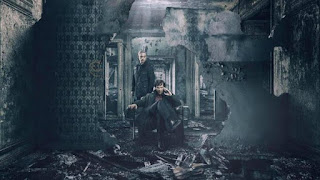"The Final
Problem" was the last episode of Sherlock's fourth series (and possibly
the last episode of the show, period). While many of the elements were
on display that have made Sherlock so enjoyable over the years, I
nevertheless found it a disappointing episode -- an unfortunate note to
go out on, if indeed it is the final one.
SPOILERS, people! The nature of this episode is simply too tricky to talk about without them.
This
story revolved around the lost Holmes sister, Eurus, and her
Moriarty-like efforts (aided from beyond the grave by Moriarty himself)
to force her brothers into a series of sadistic games. Along the way,
Sherlock uncovers long-buried memories about the sibling he didn't know
he had.
First,
let's start with what worked. As always, such a list begins with the
performances of the main actors. Sadly, Martin Freeman was given little
of import to do in this episode, but Benedict Cumberbatch was stellar as
always with his machine gun delivery. This episode in particular
provided many moments running counter to the notion that Sherlock is a
purely uncaring sociopath. Cumberbatch did a good job integrating these
glimpses of humanity (more than ever before) in a way that blended
naturally with the character we've known all along.
Sian
Brooke, the actress who played Eurus, was also excellent. She was
called upon her to play everything from black-hearted villain to
emotionally hollowed-out child, and she nailed all these moments. Also a
pure delight was the return of Andrew Scott as Moriarty. He was a
garnish this time rather than the main course, but his every moment was
an answer to the show's playful question: "Miss me?" Yes!
Yet
the story itself was a rickety tower of implausible conceits. Any one
of them could have been overlooked in a reasonable suspension of
disbelief, but the overwhelming whole of them was simply too much to
swallow. Sherlock and John decide that the best way to confront Mycroft
about the secret Holmes sibling is to stage a waking nightmare? How
exhaustive are the "in the event of my death" recordings left behind by
Moriarty and Mary Watson?
Then
there was the ever-expanding ridiculousness of Eurus. She has a
Kilgrave-adjacent power to instantly enslave any "normal" she speaks
with? And this is the best she can dream up to do? She can leave her
captivity any time she chooses (and indeed does slip out to London for
occasional fun), yet decides to go back to prison afterward? She
orchestrated all of this over a period of years just because she really
wanted a hug? I did compliment Sian Brooke's performance a moment ago,
but she really shouldn't have had to play such an inconsistent
hodgepodge of scenes in the first place.
I
was also disappointed in the scenes of great import that were
subsequently ignored or undone. 221B Baker Street was destroyed in an
explosion... but rebuilt in a quick montage. Sherlock was forced to say
"I love you" to Molly Hooper... but we saw none of the consequences of
that. The writing seemed to want to make big moves for the future, but
had to hedge its bets on there never being a future, should Cumberbatch
and Freeman elect not to return for more episodes.
Within
any given scene were fun moments to remind you that even "bad Sherlock"
is better than most television: John and Sherlock's advice to each
other to approach their situation as soldiers; Mrs. Hudson taking
pleasure in Mycroft's role as a regular client; replacing the graffiti
and bullet holes on the wall of the restored Baker Street flat. Yet I
was still left not completely satisfied.
I'd grade "The Final Problem" a B-. On the one hand, I want there to be more Sherlock so they can leave things on a higher
note. On the other, they knew there was a chance this could be end
forever, and this was the best they could muster; maybe best now just to
leave it alone.

No comments:
Post a Comment